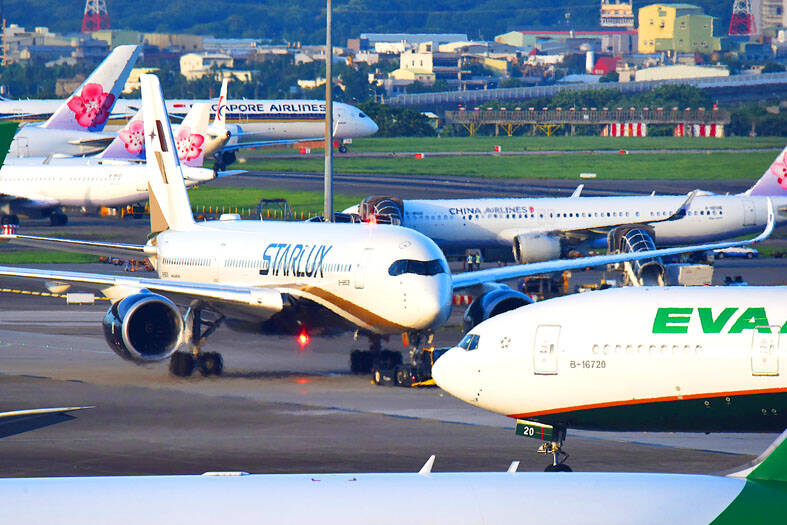The nation’s four major international carriers — China Airlines Ltd (CAL, 中華航空), EVA Airways Corp (長榮航空), Starlux Airlines Co (星宇航空) and Tigerair Taiwan Ltd (台灣虎航) — reported record sales last month, helped by three holiday weekends during the month.
CAL said its consolidated sales rose 5.7 percent from a year earlier to NT$18.11 billion (US$583.2 million), benefiting from an increase in passenger demand helped by the holidays.
Last month, there were three long weekends: Oct. 4 to 6, Mid-Autumn Festival; Oct. 10 to 12, Double Ten National Day; and Oct. 25 to 26, Taiwan Restocession Day.

Photo: Wu Liang-yi, Taipei Times
CAL said sales generated from its passenger flights rose 8.98 percent from a year earlier to NT$10.99 billion, also an October record, with demand for flights to Australia particularly strong.
Its load factor — an industry metric that measures percentage of passenger capacity used — on Australian routes topped 90 percent last month.
Demand for travel to Japan and South Korea was also strong, and growth is expected to continue this month, as about 90 percent of available seats to Tokyo, Osaka, Nagoya, Seoul and Busan are booked, the airline said.
With Taiwan’s exports, paced by artificial intelligence (AI) servers and other electronic items, continuing to boom, CAL’s cargo revenue also rose 3.32 percent from a year earlier to NT$5.55 billion.
CAL said the fourth quarter is a traditional peak season for cargo services, and revenue growth is expected to continue.
EVA Air said its consolidated sales rose 3.66 percent year-on-year to NT$18.90 billion, with revenue from passenger flights and cargo services hitting NT$11.95 billion and NT$4.70 billion respectively.
The airline said the three holiday weekends lifted its passenger sales as its load factor to destinations in Europe nearly hit 90 percent last month.
At the same time, AI server and semiconductor shipments gave a boost to its cargo service revenue during the month, it said.
Meanwhile, Starlux Airlines said its consolidated sales rose 19 percent from a year earlier to about NT$3.70 billion, while Tigerair Taiwan posted consolidated sales of NT$1.57 billion, up 20.3 percent from a year earlier as its average load factor surpassed 86 percent.

PERSISTENT RUMORS: Nvidia’s CEO said the firm is not in talks to sell AI chips to China, but he would welcome a change in US policy barring the activity Nvidia Corp CEO Jensen Huang (黃仁勳) said his company is not in discussions to sell its Blackwell artificial intelligence (AI) chips to Chinese firms, waving off speculation it is trying to engineer a return to the world’s largest semiconductor market. Huang, who arrived in Taiwan yesterday ahead of meetings with longtime partner Taiwan Semiconductor Manufacturing Co (TSMC, 台積電), took the opportunity to clarify recent comments about the US-China AI race. The Nvidia head caused a stir in an interview this week with the Financial Times, in which he was quoted as saying “China will win” the AI race. Huang yesterday said

Nissan Motor Co has agreed to sell its global headquarters in Yokohama for ¥97 billion (US$630 million) to a group sponsored by Taiwanese autoparts maker Minth Group (敏實集團), as the struggling automaker seeks to shore up its financial position. The acquisition is led by a special purchase company managed by KJR Management Ltd, a Japanese real-estate unit of private equity giant KKR & Co, people familiar with the matter said. KJR said it would act as asset manager together with Mizuho Real Estate Management Co. Nissan is undergoing a broad cost-cutting campaign by eliminating jobs and shuttering plants as it grapples

The Chinese government has issued guidance requiring new data center projects that have received any state funds to only use domestically made artificial intelligence (AI) chips, two sources familiar with the matter told Reuters. In recent weeks, Chinese regulatory authorities have ordered such data centers that are less than 30 percent complete to remove all installed foreign chips, or cancel plans to purchase them, while projects in a more advanced stage would be decided on a case-by-case basis, the sources said. The move could represent one of China’s most aggressive steps yet to eliminate foreign technology from its critical infrastructure amid a

MORE WEIGHT: The national weighting was raised in one index while holding steady in two others, while several companies rose or fell in prominence MSCI Inc, a global index provider, has raised Taiwan’s weighting in one of its major indices and left the country’s weighting unchanged in two other indices after a regular index review. In a statement released on Thursday, MSCI said it has upgraded Taiwan’s weighting in the MSCI All-Country World Index by 0.02 percentage points to 2.25 percent, while maintaining the weighting in the MSCI Emerging Markets Index, the most closely watched by foreign institutional investors, at 20.46 percent. Additionally, the index provider has left Taiwan’s weighting in the MSCI All-Country Asia ex-Japan Index unchanged at 23.15 percent. The latest index adjustments are to